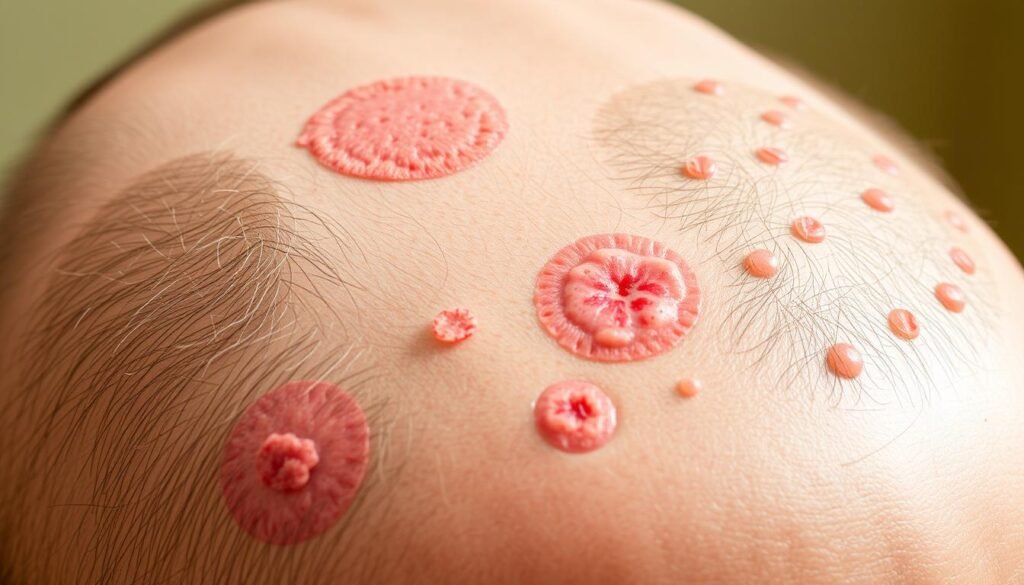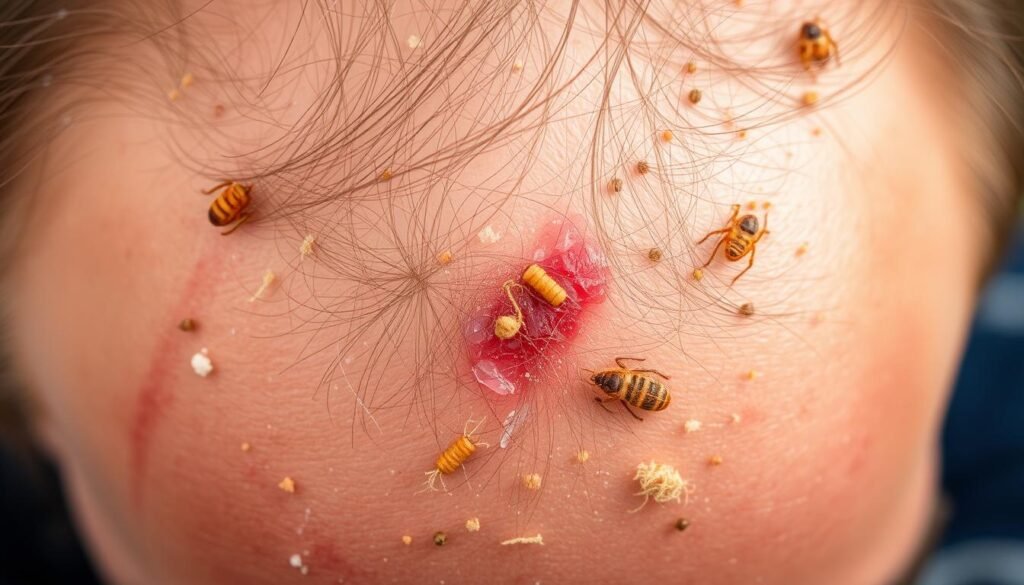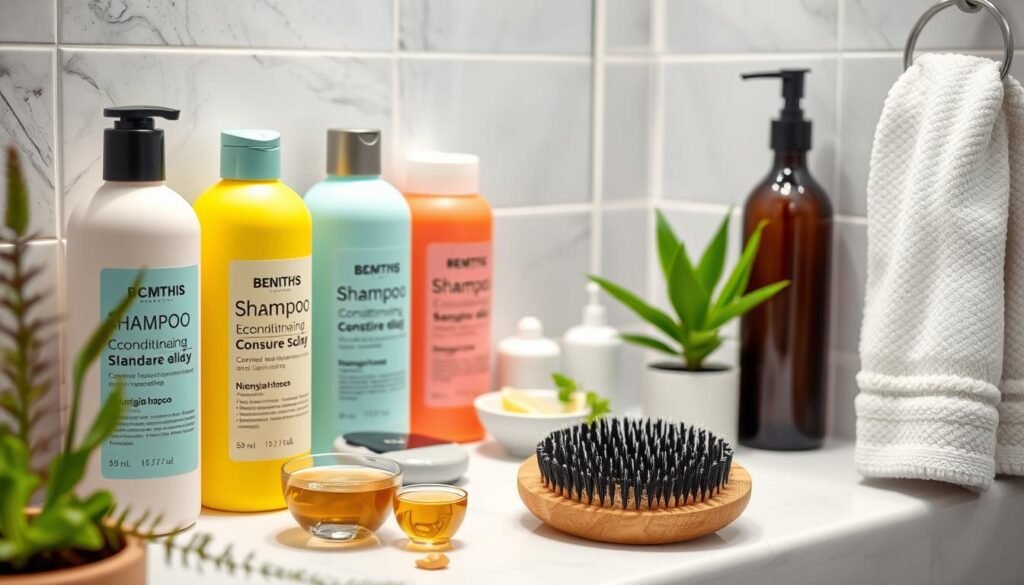Did you know nearly half of all adults face dandruff at some point? This is often the main reason behind an itchy scalp. Many look for reasons, as itchy scalp causes vary from skin issues like seborrheic dermatitis to pests such as head lice. It’s not only bothersome but also might show bigger health concerns need tackling to keep your scalp healthy.
We’ll look into why itchy scalps happen, focusing on frequent causes such as dandruff, seborrheic dermatitis, and fungal issues. We’ll also share how to fight these problems. This guide aims to help with irksome skin problems or hygiene facts. It gives clear steps to beat that endless itch.
Key Takeaways
- Dandruff is a prevalent cause of an itchy scalp, often linked to fungal infections or skin conditions.
- Seborrheic dermatitis, characterized by red and inflamed skin, frequently occurs on oily areas like the scalp.
- Conditions like psoriasis and eczema can lead to dry, itchy patches that require proper management.
- Good personal hygiene and regular checks can help prevent infestations and skin irritations.
- Seeking professional help is essential if over-the-counter treatments fail or if severe itching persists.
Understanding Itchy Scalp: An Overview
The skin on your scalp is thinner than other body parts. This makes it more sensitive to allergic reactions. These reactions often come from the ingredients in hair products. They lead to scalp problems that can feel very uncomfortable.
A lot of people deal with an itchy scalp because of dandruff. Dandruff makes your scalp dry and flaky. Luckily, you can manage it with dandruff shampoos and treatments found at the store. If it gets really bad, called seborrheic dermatitis, you might need a professional’s help.
Folliculitis is when your hair follicles get inflamed. It can look like painful bumps. Minor cases often get better on their own in a few days. But if it keeps bothering you, you should see a doctor. Head lice, especially in kids 3-11 years old, can also make your scalp very itchy. There are special shampoos to treat it.
Psoriasis, a long-term immune disorder, can make your scalp itch too. You can treat it with creams or medicines your skin doctor prescribes. Nerve-related itch might happen after an injury. This needs a doctor to look at and treat.
If you don’t wash your hair often, itchiness might get worse after a few days. Washing your hair more often could help reduce the itch. But, if you don’t rinse well, it might make things worse. Knowing why your scalp itches can help you fix the problem.
Common Causes of Itchy Scalp
An itchy scalp can come from many scalp itching causes affecting people in different ways. Dandruff is a key reason for this, often causing flakes and irritation. This leads to scratching that can make things worse.
Seborrheic dermatitis is another big cause, showing up as redness and greasy, scaly skin. Psoriasis and eczema are also important to mention. They can cause inflammation and a lot of itchiness. Conditions like alopecia areata, an autoimmune disorder, can lead to hair loss and itching, too.
Sometimes, allergic reactions to hair care products can make your scalp upset and inflamed. Choosing the right products is very important. If they bother you, stopping their use is key. Fungal infections like ringworm can harm hair follicles and might cause hair loss. Antifungal creams are often used to get the scalp back to healthy.
Folliculitis can also bring temporary hair loss and irritation. Treatment might need immunotherapy or antifungal medicines. Some home remedies, changes in diet, and special products can help soothe an itchy scalp.
| Condition | Symptoms | Treatment Options |
|---|---|---|
| Dandruff | Flaking, itching | Anti-dandruff shampoos, natural oils |
| Seborrheic dermatitis | Redness, yellow/white scales | Topical steroids, medicated shampoos |
| Psoriasis | Inflammation, itching | Creams, ointments |
| Fungal infections | Irritation, possible hair loss | Prescription antifungal treatments |
| Allergic reactions | Scalp inflammation, itching | Discontinue use of allergens |
It’s important to know these different causes to treat and relieve symptoms effectively. People should check their scalp often. This ensures they get the right help and manage common scalp issues on time.
Why Is My Head So Itchy: Identifying the Culprits
Finding out why your scalp itches is key to feeling better. Various conditions can make your scalp itch. Each one shows different signs. Dandruff is a frequent cause, causing skin to flake off. For some, it turns into seborrheic dermatitis, affecting more than just the scalp.
Head lice, often found in kids, can bother people of any age. They cause a lot of itching. Scabies comes from close contact with others. It is common in nursing homes or with kids, showing how itchy scalps can start anywhere.
Looking at scalp symptoms, psoriasis is known for red, bumpy, and scaly patches. Ringworm, despite its name, is a fungus affecting mainly kids, leading to itchiness. Hair products with certain chemicals can cause contact dermatitis, resulting in a lot of itching.
Folliculitis, the inflammation of hair follicles, creates pimple-like bumps that itch. Itching can also point to scarring alopecia, which includes hair loss and damage to follicles.
If itching doesn’t stop, it might be serious, like skin cancer. A dermatologist’s check is crucial if symptoms don’t go away. Allergy-prone folks might find some hair products make their scalp itchy.
Knowing the symptoms of these conditions helps in evaluating yourself. It’s important to see a healthcare provider if problems don’t clear up. They can diagnose you and suggest the right treatment.
Dandruff: The Frustrating Flake
Dandruff affects about half the world’s adult population. It happens when dead skin sheds from the scalp. This leads to dandruff causes like flakes and itching. Certain groups, like men and those with oily hair or health issues, see it more.
What Causes Dandruff?
Many things can lead to dandruff, including:
- Dry skin: Flakes can increase with dry skin, especially during seasonal changes.
- Oily scalp: Too much oil can help yeast called Malassezia grow, which adds to the problem.
- Skin conditions: Issues like seborrheic dermatitis and psoriasis make dandruff worse.
- Age and Gender: Dandruff is common in puberty and more in males.
- Health Effects: Those with conditions like Parkinson’s disease or HIV are at greater risk.
Treatment Options for Dandruff
Treating dandruff usually means using a mix of methods and making lifestyle tweaks. Recommended options often include:
- Over-the-counter shampoos: Using shampoos with ketoconazole, selenium sulfide, or zinc pyrithione can be effective.
- Home remedies: Try natural fixes like baking soda, apple cider vinegar, or coconut oil.
- Regular scalp hygiene: A good shampoo routine and regular hair care can keep symptoms at bay.
- Consulting a specialist: A dermatologist can offer specific treatments for tough cases.
Taking care of your scalp can reduce dandruff symptoms. Paying attention to scalp health improves its condition.
Seborrheic Dermatitis: When the Scalp Gets Inflamed
Seborrheic dermatitis is a common yet annoying condition. It causes scalp inflammation and other troubling symptoms. People often have itchy scalps with greasy, scaly patches. These seborrheic dermatitis symptoms show as red, inflamed areas. They can spread beyond the scalp to other oily parts of the body.
Symptoms and Signs
Knowing the signs of seborrheic dermatitis helps with effective management. The common symptoms are:
- Itchy and irritated scalp
- Dry or greasy scales
- Yellow or red scaly rash appearing in various areas
For teenagers and adults, seborrheic dermatitis often sticks around without treatment. It needs careful management to lessen its impact and bring back comfort.
How to Manage Seborrheic Dermatitis
To manage seborrheic dermatitis, start with over-the-counter dandruff shampoos. They should contain selenium, zinc pyrithione, or coal tar. These can ease mild cases. For stubborn issues, antifungal shampoos like ciclopirox (Loprox®) or ketoconazole (Nizoral®) might be needed. A healthcare provider can create a personalized treatment plan.
For tougher cases, you might need stronger shampoos with betamethasone valerate or fluocinolone. Healthcare providers may also suggest topical antifungals, corticosteroids, or calcineurin inhibitors for other areas. They’ll show you how to apply these treatments for the best results.
Management strategies depend on age, health, and personal likes. Severe cases could require oral antifungal meds or phototherapy. Professional advice is crucial. Understanding the best approach can greatly improve life for those with this chronic issue.
| Treatment Options | Recommended Products | Frequency of Application |
|---|---|---|
| Over-the-Counter Shampoos | Selenium, Zinc Pyrithione, Coal Tar | As directed on product label |
| Antifungal Shampoos | Ciclopirox (Loprox®), Ketoconazole (Nizoral®) | 2-3 times a week |
| Topical Corticosteroids | Betamethasone Valerate, Fluocinolone | As prescribed |
| Calcineurin Inhibitors | Pimecrolimus Cream, Tacrolimus Ointment | Twice daily |
Understanding Other Skin Conditions
Itchy scalps are often caused by skin issues like psoriasis and eczema. These problems can make you really uncomfortable. And they need special care to keep symptoms in check.
Psoriasis: Chronic and Challenging
Psoriasis is an ongoing skin problem that shows up as raised, red spots with silvery scales. It’s hard to handle when it appears on your scalp. You might need creams, light therapy, or medicine. Seeing a skin doctor regularly is key, especially when it gets worse.
Eczema: The Itchy, Dry Condition
Eczema makes your skin dry and itchy. If it’s on your scalp, it can be really bothersome. It might itch so much that it affects your day. To manage it, keep your skin moisturized and use treatments to lessen the redness. Understanding eczema’s long-term nature helps in dealing with scalp issues better.

Insects and Infestations: Head Lice and More
Head lice are tiny insects that feed on blood from the scalp. They cause a lot of discomfort. Each year, 6 to 12 million kids in the U.S. get head lice. This often happens through direct contact, like during play. It’s important for parents to quickly spot head lice symptoms.
What are Head Lice?
Spotting head lice can be tough. They’re usually found at the neck’s nape and around the ears. A female louse can lay about six eggs daily. These eggs, called nits, can live for two weeks on hair. But, they die in a week without warmth. Interesting fact: girls get head lice more often than boys, probably because they play closer together.
Treatment Approaches for Lice Infestations
To treat lice, use special shampoos with 1% permethrin (Nix) in them. It’s important to follow the instructions carefully. If the lice don’t go away, you might need to see a doctor for stronger treatments. To avoid getting lice again, wash clothing and linens in hot water. Also, try to stay away from people who have lice. There are products that say they keep lice away, but they might not always work. Parents should be on the lookout for lice signs. Quick action helps stop the spread in schools and homes. Learn more about lice symptoms.
Allergic Reactions and Irritants
An itchy scalp can often come from allergic reactions. These reactions can be caused by chemicals in hair products, dyes, and even some foods. Knowing what triggers these allergies is key to managing them.
Common Allergens Affecting the Scalp
There are many allergens that can bother the scalp. Some of these include:
- Chemicals in hair dyes, especially Para-phenylenediamine, are known to cause sensitivity.
- Fragrances and preservatives in shampoos and conditioners can be problematic.
- Proteins in some hair care products might not be good for everyone’s skin.
- Natural things like pollen or dust can also make your scalp itch.
Finding out what irritates your scalp is the first step to feeling better. Checking out resources like this comprehensive article can give you more info on scalp issues.
How to Avoid Irritating Hair Products
To keep your scalp happy, be careful with hair care products:
- Always test new products on a small skin area before using them fully.
- Look for products that are hypoallergenic and don’t have fragrances.
- Don’t use too many different products at once to avoid bad reactions.
- If scalp problems don’t improve, see a dermatologist for expert advice.
Pay attention to the ingredients in hair products to lower the chance of allergies. Being well-informed and cautious helps a lot with scalp allergies.

Fungal Infections: Tinea Capitis
Tinea capitis, or ringworm of the scalp, mainly affects kids but can hit anyone. If you have skin injuries, don’t keep clean, or stay wet too long, you’re at higher risk. Knowing the tinea capitis symptoms early on helps treat it fast and avoid worse problems.
Recognizing Symptoms of Fungal Infections
Scaly patches and bald spots are common signs on the scalp. Look out for:
- Itchy, inflamed skin
- Small black dots where hair has broken off
- Pus-filled sores
- Low-grade fever and swollen lymph nodes
These symptoms can be mild or severe. Without treatment, they can cause lasting hair loss or scars.
Treatment Guidelines for Fungal Infections
Treating this infection means seeing a doctor. Here’s what’s usually done:
- Oral antifungal medication for 4 to 8 weeks
- Using special shampoos
- Cleaning personal stuff to stop the infection from coming back
Check if family or pets are also infected. To keep the infection from spreading, wash towels in hot water and clean combs with bleach. If things get worse or don’t get better, see your doctor right away.
| Symptom | Description |
|---|---|
| Scaly patches | Rough, flaky areas on the scalp. |
| Bald spots | Round patches with short stubble or black dots from broken hair. |
| Painful sores | Infected areas may develop pus-filled bumps. |
| Fever | Low-grade fever may accompany the infection. |
| Swollen lymph nodes | Lumps may be felt in nearby neck or jaw areas. |
Being aware and taking quick action are key to effectively handle tinea capitis. It lowers the risk of complications from treating fungal infections.
Hygiene Practices and Scalp Health
Keeping a healthy scalp mainly boils down to good hygiene. Washing your hair is vital, removing oils, dead skin, and allergens. These unwanted elements cause itchiness and irritation. Having a regular wash routine is key in fighting off problems like dandruff and seborrheic dermatitis.
Importance of Regular Cleaning
How often you wash your hair is important for a clean scalp. People with straight hair might wash it daily or every second day to control oil. But, those with curly or textured hair could find once a week adequate. Clean regularly for a balanced scalp condition.
Best Practices to Maintain Scalp Hygiene
Picking the right shampoo is a must for a healthy scalp. Look for zinc pyrithione in shampoos to ease dandruff itching. Salicylic acid shampoos are good for scalp psoriasis, and ketoconazole fights seborrheic dermatitis. Always rinse out hair products well to avoid irritation from buildup.
Adding essential oils like coconut or tea tree oil can also reduce itchiness. Use warm, not hot, water to avoid drying out your scalp. If itchiness lasts more than a few days or comes with a rash, see a healthcare provider.

Good scalp hygiene enhances your health and comfort. It’s a key part of personal care, preventing irritations and ensuring a healthy scalp environment. For more about scalp health and hygiene, check out this resource.
Conclusion
Many things can cause an itchy scalp. These range from common conditions like dandruff to lifestyle and diet choices. Knowing the causes is key to managing them well. This knowledge helps individuals take steps towards better scalp health.
There are trusted treatments available in stores. These often contain salicylic acid or ingredients that stop yeast growth. For lice problems, treating the whole household is crucial to get rid of them.
Keeping your scalp clean and eating a diet with plenty of omega-3s is good for your scalp. If the itchiness doesn’t go away or if it’s painful or causes hair loss, see a doctor. They can offer the right treatment and advice for you.